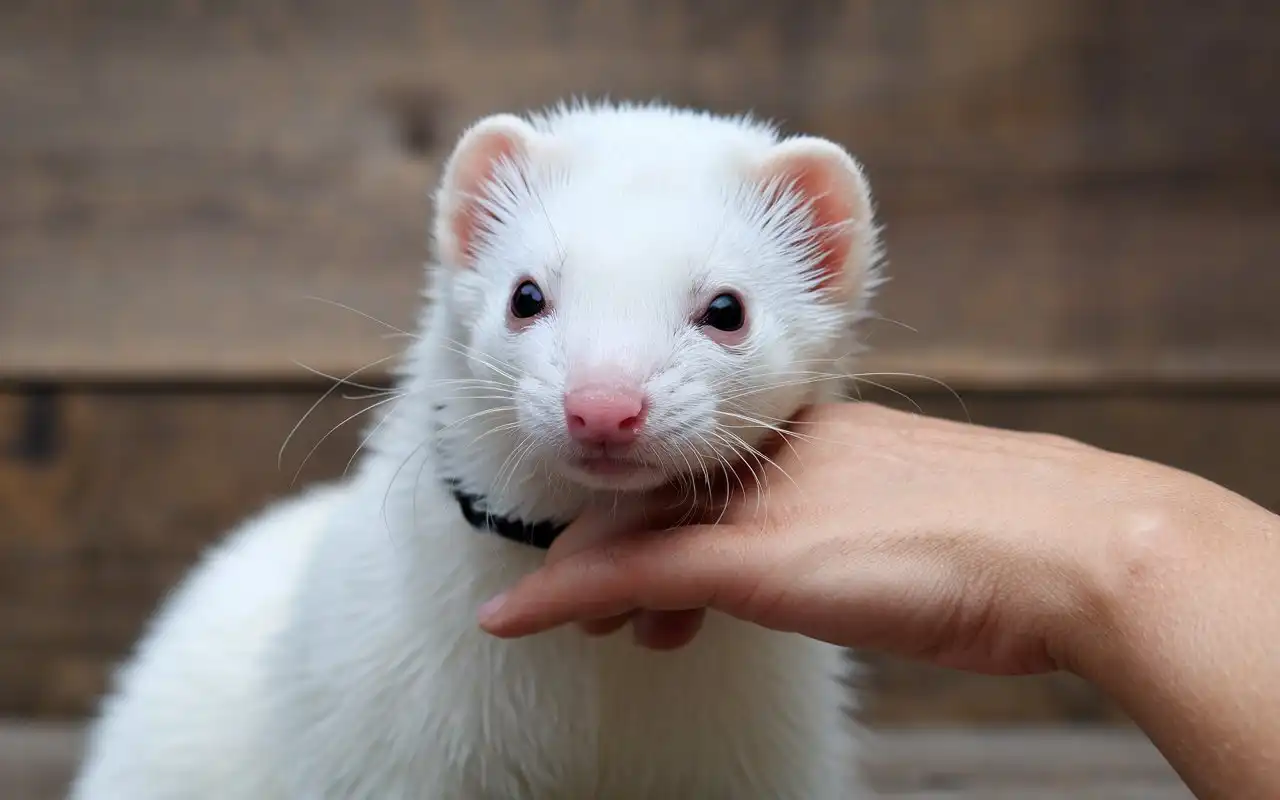Have you ever wondered how long do ferrets live? Anyone thinking of getting these curious, playful creatures as pets must know their lifespan. Ferrets have distinct needs and require dedicated care to ensure they live long, healthy lives. This guide will cover ferret lifespans, factors that affect them, and how to keep them healthy and happy. This article will help all ferret owners, new and experienced. It will ensure your furry friend thrives.
Table of Contents
How Long Do Ferrets Live?
The question of how long do ferrets live often comes up among prospective pet owners. On average, ferrets live between 6 to 10 years, with most pet ferrets living around 7 to 9 years. However, with proper care, some ferrets can reach the higher end of this range. Factors such as genetics, diet, exercise, and regular veterinary care play crucial roles in determining a ferret’s lifespan. Wild ferrets may have shorter lifespans due to predators and limited food. Pet ferrets, in a controlled environment, can live much longer.



Understanding the Ferret Life Cycle
Baby Ferrets (Kits)
Ferrets begin life as kits, small and fragile. During this stage, which lasts for around 2 to 3 months, they grow rapidly, developing social skills and becoming more independent. Kits are highly playful and require lots of attention from their mother and, eventually, their human caregivers. At this stage, they need a diet rich in protein and fat to support their fast growth. Socialization during this period is key to ensuring they grow into well-adjusted adult ferrets.
Adolescent Ferrets
From 3 to 12 months, ferrets enter adolescence. At this stage, they are highly energetic and curious, making it a great time for training and socialization. Adolescence is when ferrets start to explore more. So, it’s crucial to ferret-proof your home to keep them safe. Behavioral training now can shape their future interactions. It can help curb unwanted habits. This stage is full of energy. Playtime and interaction are key for their development.
Adult Ferrets
The adult stage, from 1 to 4 years, is when ferrets reach their full size and strength. During this period, it’s essential to maintain a balanced diet and provide plenty of mental stimulation to keep them healthy. Adult ferrets are at their most active and require lots of enrichment activities to prevent boredom. This is also the stage where owners should pay close attention to their weight and health, ensuring that they remain active and fit. Regular veterinary check-ups during this time can help catch any potential health issues early.
Senior Ferrets
As ferrets age, usually around 4 to 7 years, they start showing signs of slowing down. Senior ferrets need extra care, including more frequent vet visits and softer food options, to support their aging bodies. This stage may bring about changes in their energy levels and a greater need for rest. It’s important to monitor their health closely. Senior ferrets are more prone to illnesses like adrenal disease and insulinoma. With proper care and a comfortable living environment, many senior ferrets can still enjoy an active and happy life.

Factors That Affect How Long Ferrets Live
Genetics and Breed Considerations
Genetics play a significant role in determining how long ferrets live. Some breeds may be more predisposed to certain health issues, affecting their lifespan. For example, ferrets bred from a strong genetic line tend to have fewer health problems, potentially allowing them to live longer. When adopting or purchasing a ferret, it’s crucial to choose from a reputable breeder who prioritizes genetic health. Also, research the breed’s common health risks. This can help you prepare for challenges and ensure a longer life for your ferret.
Importance of Diet in a Ferret’s Lifespan
A ferret’s diet is one of the most significant determinants of their longevity. Feeding them high-quality, protein-rich food can greatly enhance their lifespan. Ferrets are mandatory carnivores. Their diet must be mainly meat. Protein contributes to constructing powerful muscles, whereas fats deliver energy. A diet lacking in these essential nutrients can lead to malnutrition and a host of health problems. Avoid sugary treats. Feed raw meats or specialized ferret kibble. This will give them the nutrients for a long, active life.
Impact of Exercise and Mental Stimulation
Regular playtime and interaction are vital for a ferret’s physical and mental well-being. Without enough exercise, ferrets can get overweight. This can cause health problems and shorten their lives. Ferrets love to run, chase, and explore, and providing them with a variety of toys and activities can keep them both physically and mentally fit. Daily play sessions will strengthen your bond with your pet. They will also help your pet burn energy and stay at a healthy weight.
Role of Vet Care and Regular Check-Ups
Routine vet visits can catch health issues early. Vaccinations, dental care, and check-ups are vital. They keep your ferret healthy for life. A vet with experience in exotic animals, especially ferrets, can help. It is vital for managing their unique health needs. Regular health screenings can detect common conditions in older ferrets, like adrenal disease. Early intervention often leads to better outcomes, making routine vet care an investment in your ferret’s long-term health.

How to Extend Your Ferret’s Lifespan
Balanced Diet for Longevity
A balanced diet is key to keeping your ferret healthy. Look for foods with high protein content (around 30-40%) and low carbohydrates. Ferrets have a fast metabolism, so they need to eat several small meals throughout the day. Feeding them a diet that closely mimics their natural prey, such as raw meat or high-protein kibble, can support their growth and health. Fresh water should always be available to keep them hydrated, especially during warmer months.
Creating a Safe and Enriching Environment
Ferrets are natural explorers, and a safe, enriching environment can help them thrive. Provide them with plenty of tunnels, toys, and space to roam safely, ensuring their curiosity doesn’t lead to accidents. To ferret-proof your home, block small spaces. Remove hazards like rubber or foam. This can prevent injuries. Enrichment activities, like interactive toys and puzzle feeders, keep their minds active. They reduce stress, which is vital for their well-being.
Regular Veterinary Visits
Just like humans, ferrets benefit from preventative healthcare. Yearly check-ups and prompt attention to any signs of illness can significantly extend their lifespan. Regular vet visits help ensure that any emerging health issues are addressed before they become severe. Vaccinations against rabies and distemper are critical, as these diseases can be fatal for ferrets. Also, routine blood tests can monitor their health. They provide a better view of their well-being.
Proper Hygiene and Grooming Practices
Ferrets need regular grooming. This includes nail trimming and ear cleaning. Keeping their living space clean can also prevent infections and ensure a healthier life. Bathing your ferret occasionally helps keep their coat clean, but be careful not to over-bathe, as it can dry out their skin. Brushing their fur can reduce shedding and prevent hairballs, especially in long-haired varieties. Hygiene practices, like cleaning bedding and litter boxes, help. They prevent bacteria and keep a clean environment.
Common Health Issues in Ferrets
Adrenal Disease
Adrenal disease is a common issue that affects ferret lifespans. It causes hair loss and hormonal imbalances. This condition can cause significant discomfort and affect their quality of life. Symptoms include hair thinning, increased aggression, and swollen genitals. Early diagnosis can improve outcomes through medical treatments or surgery. A veterinarian specializing in exotic pets can provide the best care for managing adrenal disease.
Insulinoma
Insulinoma, a type of pancreatic tumor, is common in ferrets and affects their insulin levels. It requires careful management and can impact a ferret’s quality of life if not treated properly. Signs of insulinoma include lethargy, weight loss, and episodes of low blood sugar. With the right meds and diet, many ferrets can live comfortably with this condition. Regular monitoring of their glucose levels can help ensure they remain stable.
Digestive Issues
Ferrets have sensitive digestive systems. Ingesting non-food items can cause life-threatening blockages. So, it’s crucial to monitor their environment for hazards. Symptoms of a blockage include vomiting, loss of appetite, and abdominal pain. If you think your ferret ate something harmful, get to a vet right away. Feeding a diet that promotes gut health, such as raw bones and high-protein kibble, can reduce the risk of digestive issues.
Respiratory Problems
Respiratory issues can develop due to infections or environmental irritants. Keeping their living space clean and smoke-free helps reduce these risks. Signs of respiratory issues include sneezing, nasal discharge, and difficulty breathing. Ferrets are susceptible to certain strains of flu, so it’s important to monitor their health closely during cold seasons. A warm, draft-free environment can help prevent respiratory infections, especially in older ferrets.

How Long Do Ferrets Live in Captivity vs. the Wild?
Lifespan of Pet Ferrets
In captivity, with proper care, ferrets can live up to 10 years. Their lifespan is extended due to the consistent availability of food, shelter, and veterinary care. Pet ferrets benefit from a stable diet, protection from predators, and a safe environment, all of which contribute to a longer life. Owners can extend their lifespan by providing a stress-free home and regular health checks.
Lifespan of Wild Ferrets
Wild ferrets, such as the endangered black-footed ferret, typically have shorter lifespans of 2 to 4 years. This is due to factors like predation, disease, and food scarcity. Wild ferrets face harsh nature. It’s tough to survive. So, they live much shorter than domesticated ferrets. Conservation efforts have increased wild ferret numbers. But, their lifespan is shorter due to the risks of living in the wild.
Recognizing the Signs of Aging in Ferrets
Physical Changes
As ferrets age, they change. These changes can help you spot their transition into old age. One of the first signs is graying fur, especially around their face and paws. Weight loss is also common in older ferrets, as their metabolism slows down. You may notice that they become less agile and struggle to keep up with their usual playful nature. It’s crucial to adjust their diet to include softer, high-protein foods that are easier for them to digest. Also, a warmer sleeping area can help older ferrets. They might be more responsive to temperature fluctuations.
Behavioral Changes
Behavioral changes are another indicator of aging in ferrets. Younger ferrets are very energetic. Older ferrets may nap more and be less active. It’s normal for them to show less interest in playtime or become tired more quickly after short bursts of activity. They might also become more vocal, using squeaks or noises to express discomfort or seek attention. Monitoring these changes closely can help determine when it’s time for a vet visit. By understanding these shifts in behavior, you can adjust their routine. This will help them feel secure and loved in their golden years.
How Long Do Ferrets Live? Myths vs. Facts
Common Misconceptions About Ferret Lifespan
A common myth surrounding ferrets is that they can live up to 15 years or more. While there have been rare cases of ferrets living past 10 years, this is not typical. Most ferrets live between 6 to 10 years, with 7 to 9 years being the most common lifespan. Believing that all ferrets can live so long can raise pet owners’ expectations. It’s important to be aware that genetics, diet, and access to veterinary care play significant roles in determining how long do ferret live. The idea that every ferret will live well into its teens is more of a hopeful wish than a standard reality.
Realities of Owning an Older Ferret
Owning a senior ferret comes with unique challenges and rewards. As they age, their health needs change, requiring more frequent vet visits and adjustments to their diet and living conditions. Senior ferrets are more likely to develop conditions that can harm their quality of life. These include adrenal disease, insulinoma, and digestive issues. However, with a bit of extra care and attention, older ferrets can remain affectionate and enjoy their time with you. Making your home more senior-friendly can greatly enhance their comfort. Use ramps instead of stairs and lower bedding areas.
Coping with the Loss of a Pet Ferret
Grieving the Loss of a Ferret
Losing a beloved ferret is a deeply emotional experience. These small creatures become a significant part of our lives, and their playful personalities leave a lasting impact. You must allow yourself time and space to grieve. Some pet owners find comfort in creating a memorial space or writing down their favorite memories. There’s no correct or incorrect method to mourn. Just remember, your ferret found joy in your time together. Your care gave them a loving home. It’s okay to feel sadness and to reach out to other pet owners or support groups who understand your loss.
How to Remember Your Pet
Honoring the memory of a cherished ferret can help ease the pain of their loss. Some owners create a memory box filled with their ferret’s favorite toys, photos, and mementos. Others choose to plant a tree or flower in their garden as a living tribute to their pet. You might even consider creating a photo album that captures the happy moments you shared together. These keepsakes serve as a reminder of the special bond you shared and the joy your ferret brought into your life. Each time you look at them, you’ll remember the fun times and the unique quirks that made your ferret so special.

Conclusion
Knowing how long do ferrets live is key to their care. It helps us provide the best care for these delightful creatures. Genetics and diet can affect their lifespan. But, your love and care are just as important. They help ensure a long, healthy life. A healthy diet, regular exercise, and preventive care will help your ferret thrive at all life stages. Ferrets bring a special kind of joy into their owner’s life, and with the right care, they can continue to spread happiness for many years. Their playful spirit and curious nature make them cherished pets. Their unique personalities add to this. Your care for them is well worth the reward.







Pingback: Blonde Ferret: A Mischievous Tale
Pingback: Why Is My Ferret So Itchy? 8 Tips for Happy, Healthy Ferrets
Pingback: When to Worry About Your Ferret Being Sick: Expert Advice